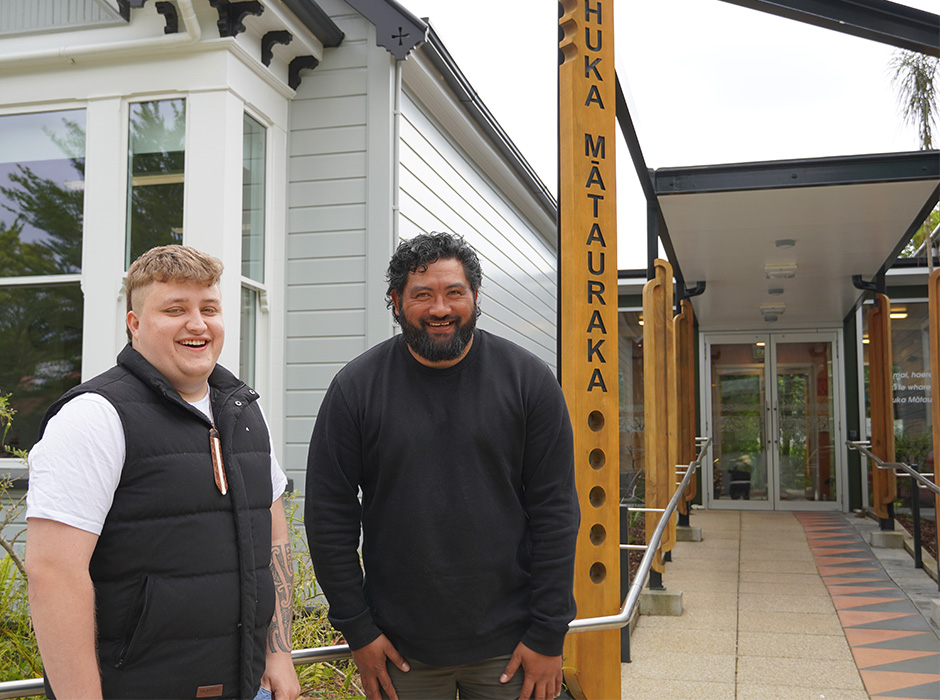
Former Mentee Matthew Harrington and Mentorship programme coordinator Jeremy Wara in the garden of the Māori Centre.
If you whakapapa Māori, you are welcome at Te Huka Mātauraka, Māori Centre.
Kaituitui Jeremy Wara (Waikato/Tainui) says tauira often worry that their te reo isn’t strong enough, or they don’t “look Māori” enough to access the support offered by the Centre, but that is simply not true.
“It doesn’t matter if you can say kia ora or not, it’s in your blood. You are Māori enough,” he says.
Te Huka Mārauraka, the Māori Centre, is nestled in the greenery between the Leith and the wananga’s new pou whenua, a whare at the heart of Māori life on campus, providing services, support, motivation and encouragement.
They are an iwi-diverse whānau packed with mātua and whāea who are dedicated to serving tauira Māori and ensuring they have access to a welcoming, calm place throughout their academic hikoi.
Wara has been running the Kā Rikarika o Tāne mentoring programme for just over a year, applying his rugby coaching and mentoring skills to a new cohort of tauira at Otago to amazing effect.
Kā Rikarika o Tāne, or ‘the hands of Tāne’ is a peer-to-peer, Māori-to-Māori, mentoring programme which uses the tikanga of relationships between teina ‘little siblings’ and tuakana ‘older siblings’ to provide safety and connection for new students away from home for the first time.
Wara carefully sets up pairs of tauira so that the tuakana can help to guide the teina through their first year at Otago.
“One of the key things I have focused on is matching pairs of tauira together who are studying the same courses.
“That means they have emotional and social support combined with academic support from someone who has been in their shoes.
“I also try and connect tauira in terms of their iwi, hapu and whakapapa which gives them even more of a connection to each other,” Wara says.
Tua, or ‘pairs’ are grouped together into whānau, headed by a mātāmua or ‘eldest sibling’ in a way that helps build whanaungatanga for tauira Māori away from home.
“The feedback has been really good, the connections were really strong this year”, Wara says.
Next year, he wants to work on making those connections even stronger.
Te Huka Mātauraka has been running the peer-to-peer mentoring programme for 21 years.
It began with only twelve tauira (six teina/tuakana pairs), and this year there were 146 enrolled in the programme.
Wara is keen to keep those numbers growing.
“There is so much support available, it’s incredible- it's just a case of getting the first-year tauira through the doors so they feel safe and comfortable in this whare and able to reach out if they need it,” Wara says.
Matthew Harrington (Kāi Tahu, Kāti Māmoe, Waitaha) was both a teina and a tuakana during his time studying Law and Māori studies at Otago and he now works full-time as the Colleges Programme Co-ordinator at Te Huka Mātauraka.
Harrington experienced some of the barriers to accessing the Māori centre that Wara describes.
“New places and spaces are scary, and I am a little shy. Mostly though, I was worried about being too Pākeha looking.
“I think a lot of Māori folks who are fair skinned like me worry that these spaces aren’t for us, but as soon as I walked through the door I realised it didn’t matter, I was treated just like everybody else.”
“Nobody here cares about my skin colour, they just care that I whakapapa Māori.”
Bachelor of Health Sciences tauira Keimarire Tibble-Brown was also both a teina and tuakana in Kā Rikarika o Tāne, and recommends the programme to all tauira Māori.
“The transition from kura to university is a big one and KROT (Kā Rikarika o Tāne creates a community for first year tauira to be supported in navigating this change by tauira who have experienced the highs and lows of this transition and are able to share their mātauranga.
“KROT facilitates fun events throughout the year that serve as well needed study breaks and opportunities to score a good feed. Not only does KROT support our first years, it also provides ongoing awhi and tautoko to tauira throughout their entire haerenga at university.”
For Keimarire, Matthew and countless other tauira Māori KROT has become a whānau away from home which has allowed them to “make lasting connections between tauira, but also pastoral and academic staff.
-Kōrero by internal communications adviser Alice Billington